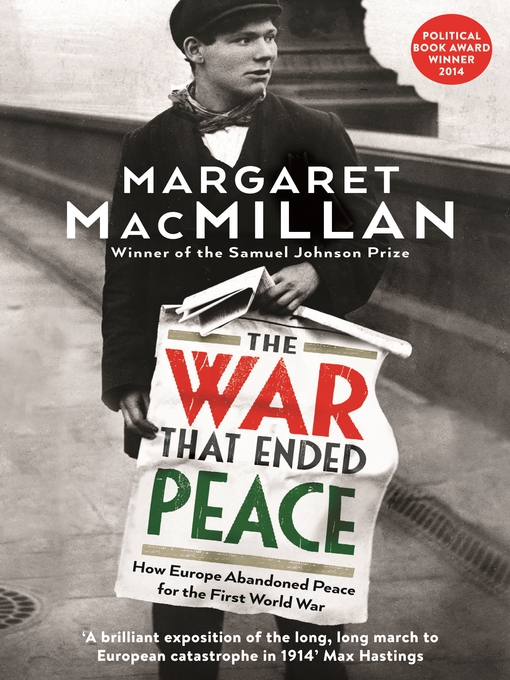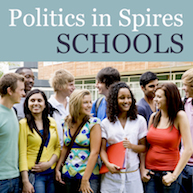 Margaret MacMillan, Professor of International History at the University of Oxford and Warden of St Antony’s College, discusses her new book ‘The War That Ended Peace’ with DPhil student Katharine Brooks. The book is a re-examination of the causes of World War One and seeks to answer the question of why the long peace preceding 1914 failed to hold. Katharine asks what Professor Macmillan felt she has been able to add to our understandings of World War One, what parallels can be drawn from 1914 to 2014 and why academia still fails to come to an agreement on the causes of this most important of world events.
Margaret MacMillan, Professor of International History at the University of Oxford and Warden of St Antony’s College, discusses her new book ‘The War That Ended Peace’ with DPhil student Katharine Brooks. The book is a re-examination of the causes of World War One and seeks to answer the question of why the long peace preceding 1914 failed to hold. Katharine asks what Professor Macmillan felt she has been able to add to our understandings of World War One, what parallels can be drawn from 1914 to 2014 and why academia still fails to come to an agreement on the causes of this most important of world events.
Interview with Margaret MacMillan: The War That Ended Peace

We use cookies on our website to give you the most relevant experience by remembering your preferences and repeat visits. By clicking “Accept”, you consent to the use of all cookies.
Manage consent
Necessary cookies are absolutely essential for the website to function properly. These cookies ensure basic functionalities and security features of the website, anonymously.
| Cookie | Duration | Description |
|---|---|---|
| _GRECAPTCHA | 5 months 27 days | This cookie is set by Google. In addition to certain standard Google cookies, reCAPTCHA sets a necessary cookie (_GRECAPTCHA) when executed for the purpose of providing its risk analysis. |
| connect.sid | 1 day | This cookie is used for authentication and for secure log-in. It registers the log-in information. |
| cookielawinfo-checbox-analytics | 11 months | This cookie is set by GDPR Cookie Consent plugin. The cookie is used to store the user consent for the cookies in the category "Analytics". |
| cookielawinfo-checbox-functional | 11 months | The cookie is set by GDPR cookie consent to record the user consent for the cookies in the category "Functional". |
| cookielawinfo-checbox-others | 11 months | This cookie is set by GDPR Cookie Consent plugin. The cookie is used to store the user consent for the cookies in the category "Other". |
| cookielawinfo-checkbox-advertisement | 1 year | The cookie is set by GDPR cookie consent to record the user consent for the cookies in the category "Advertisement". |
| cookielawinfo-checkbox-necessary | 11 months | This cookie is set by GDPR Cookie Consent plugin. The cookies is used to store the user consent for the cookies in the category "Necessary". |
| cookielawinfo-checkbox-performance | 11 months | This cookie is set by GDPR Cookie Consent plugin. The cookie is used to store the user consent for the cookies in the category "Performance". |
| viewed_cookie_policy | 11 months | The cookie is set by the GDPR Cookie Consent plugin and is used to store whether or not user has consented to the use of cookies. It does not store any personal data. |
Analytical cookies are used to understand how visitors interact with the website. These cookies help provide information on metrics such as the number of visitors, bounce rate, traffic source, etc. that help us improve the service we offer you.
| Cookie | Duration | Description |
|---|---|---|
| _ga | 2 years | This cookie is installed by Google Analytics. The cookie is used to calculate visitor, session, campaign data and keep track of site usage for the site's analytics report. The cookies store information anonymously and assign a randomly generated number to identify unique visitors. |
| _gat_gtag_UA_69029762_1 | 1 minute | This cookie is installed by Google Analytics. The cookie is used to store information of how visitors use a website and helps in creating an analytics report of how the website is doing. The data collected including the number visitors, the source where they have come from, and the pages visited in an anonymous form. |
| _gid | 1 day | This cookie is installed by Google Analytics. The cookie is used to store information of how visitors use a website and helps in creating an analytics report of how the website is doing. The data collected including the number visitors, the source where they have come from, and the pages visted in an anonymous form. |
| VISITOR_INFO1_LIVE | 5 months 27 days | This cookie is set by Youtube. Used to track the information of the embedded YouTube videos on a website. |
| YSC | session | This cookies is set by Youtube and is used to track the views of embedded videos. |
Advertisement cookies are used to provide visitors with relevant ads and marketing campaigns. These cookies track visitors across websites and collect information to provide customized ads. We do not display advertisements on our website but some cookies set by our analytics systems may collect data that is used to show targeted advertisements on other websites you visit.
| Cookie | Duration | Description |
|---|---|---|
| _fbp | 3 months | This cookie is set by Facebook to deliver advertisement when they are on Facebook or a digital platform powered by Facebook advertising after visiting this website. |
| fr | 3 months | The cookie is set by Facebook to show relevant advertisments to the users and measure and improve the advertisements. The cookie also tracks the behavior of the user across the web on sites that have Facebook pixel or Facebook social plugin. |
| IDE | 1 year 24 days | Used by Google DoubleClick and stores information about how the user uses the website and any other advertisement before visiting the website. This is used to present users with ads that are relevant to them according to the user profile. |
| NID | 6 months | This cookie is used to a profile based on user's interest and display personalized ads to the users. |
| test_cookie | 15 minutes | This cookie is set by doubleclick.net. The purpose of the cookie is to determine if the user's browser supports cookies. |
Other uncategorized cookies are those that are being analyzed and have not been classified into a category as yet.
Functional cookies help to perform certain functionalities like sharing the content of the website on social media platforms, collect feedbacks, and other third-party features.
| Cookie | Duration | Description |
|---|---|---|
| CONSENT | 16 years 8 months 26 days 14 hours | No description |
| lang | This cookie is used to store the language preferences of a user to serve up content in that stored language the next time user visit the website. | |
| yt-remote-connected-devices | never | This cookie is set by Youtube and stores user video player preferences for embedded YouTube videos |
| yt-remote-device-id | never | This cookie is set by Youtube and stores user video player preferences for embedded YouTube videos |




1 Comment
Prof Macmillan
much as I enjoyed this interview (and your book), I find your comments on the role played by honour somewhat unconvincing for 2 reasons:
1. As Vernon Bogdanor has argued (I think), Britain could not have abandoned Belgium and France to be overrun by Germany for obvious strategic reasons which have nothing to do with honour, even if Grey cited it and actually believed in it. A German commitment not to go to war with Britain would have carried little credibility, especially after it had totally ignored its guarantee of Belgium sovereignty.
2. In your comparison with today’s USA, you conflate honour with credibility. When a US president says his country must react or lose credibility, I take it to mean something very practical – that a failure to react will embolden other bullies to take advantage of American quiescence. That seems to me a very different thing indeed from the abstract concept of honour which underlay continental duelling culture pre-1914, which was not about deterrence at all, otherwise fighting with “ruffians” would not have been proscribed, but encouraged. In extremis, the duellist effectively commits suicide – hardly very effective deterrence! Credibility is about cold calculation and is rational, honour is idealistic, unthinking, and replaces calculation with the code of honour.
Thanks nonetheless
Yours
Laurence Copeland